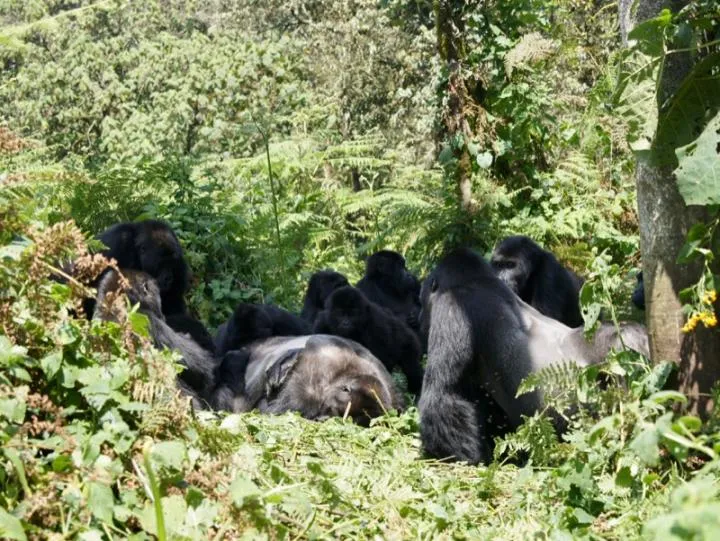Gorillas Appear to Grieve for Their Dead
Scientists found that expressions of grief even extended beyond members of the same peer group
/https://tf-cmsv2-smithsonianmag-media.s3.amazonaws.com/filer/ea/72/ea72ea34-6940-4873-88f7-662b365d525b/image_2.jpeg)
When Tuck and Titus, a pair of dominant silverback mountain gorillas from the same Rwandan social group, died within a year of each other, their primate peers exhibited an array of distressed behaviors suggestive of mourning rituals.
As researchers led by Amy Porter and Damien Caillaud of Atlanta’s Dian Fossey Gorilla Fund International report in the journal PeerJ, in the hours and days following the gorillas’ deaths, pack members gathered around their bodies, touching, grooming and otherwise interacting with them. Some males, both adult and juvenile, engaged in antagonistic behaviors, including chest beating, vocalizing, and hitting or kicking the corpse.
A juvenile male who was particularly close with Titus, a 35-year-old male, remained by his body for two days and slept in the same nest as it, while a juvenile son of Tuck, a 38-year-old female, attempted to suckle his mother’s corpse despite already being weaned.
Crucially, George Dvorsky writes for Gizmodo, the scientists found that such expressions of apparent grief extended beyond members of the same social group. When a pack of silverback Grauer’s gorillas chanced upon the body of an unknown primate—albeit one of the same species—in the Democratic Republic of Congo, they circled around it, alternately staring at and grooming the remains. Although this fallen stranger did not receive the same level of attention as Titus and Tuck, he was, as Inverse’s Sarah Sloat writes, “still seen.”
“The most surprising behavior was definitely how similar the behavioral responses were toward the corpses of integral group members and a presumably unknown non-group member,” Porter notes in an email to Dvorsky. “In gorilla society, interactions between groups or between a group and a lone silverback—a potential competitor—generally result in avoidance or aggression with or without physical contact.”
“[But] in all three cases,” Porter continues, “almost every member of the group sat quietly around the corpse and many individuals sniffed, licked, and groomed the corpse.”

According to Laboratory Equipment’s Seth Augenstein, the study’s small sample size makes it difficult to judge how often gorillas actually engage with fellow primates’ remains. Of 42 adult mountain gorilla fatalities recorded by the researchers since 2004, 22 found the ailing animal abandoned by or deliberately breaking off from the group prior to death. In 17 other instances, the scientists last spotted the gorillas while they were still alive and traveling with the group, leaving it unclear whether the primates had subsequently interacted with their corpses.
Making close contact with peers’ and unknown apes’ remains could have significant consequences for living primates, Sloat writes for Inverse. The Ebola virus has already killed thousands of African apes; if healthy animals regularly come into contact with victims’ carcasses, which secrete bodily fluids that can contaminate the surrounding vegetation, they may become unwitting carriers (and casualties) of the disease.
Gorillas are far from the only animals suspected to engage in approximations of grief: As Earth.com’s Kyla Cathey reports, elephants appear to pay their respects to the dead by lingering around sets of remains, while whales have been spotted holding onto the bodies of deceased pod members for extended periods of time. Crows are known to hold “funerals” for their fallen comrades.
Still, is it completely fair to define such behaviors, however complex, as grief?
“We have no way of knowing what exactly they were experiencing,” Porter explains to Gizmodo’s Dvorsky.
“Many researchers are quick to discount grief as an explanation for observed behaviors on the grounds that it is speculative,” she concludes. “From my perspective, I think we have a lot to learn about the ways animals engage with the world, especially animals like gorillas who are incredibly intelligent, as I am certain they experience emotions that are much more complex than we often account for.”
/https://tf-cmsv2-smithsonianmag-media.s3.amazonaws.com/accounts/headshot/mellon.png)
/https://tf-cmsv2-smithsonianmag-media.s3.amazonaws.com/accounts/headshot/mellon.png)